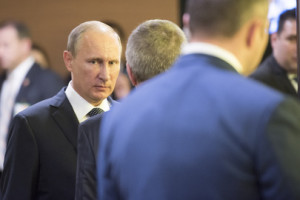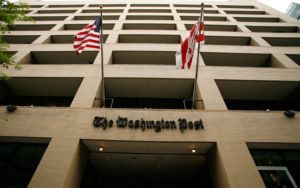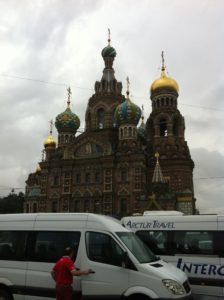Authored by James Carden via ConsortiumNews.com,
The anti-Russia hysteria – now rivaling past Red Scares with Russians hiding under every bed – has led to factual errors in press accounts and has erased standards of political fairness.
One of the more extraordinary developments since the U.S. presidential election is that the paranoia and the grotesque disregard for facts, evidence and logic that characterized the Trump-inspired “birther movement” can now be reasonably said to characterize the Left’s stance toward Donald J. Trump.

Russian President Vladimir Putin, following his address to the UN General Assembly on Sept. 28, 2015. (UN Photo)
There seems to be nothing that Trump opponents will not say and no charge, however low, they will not stoop to making as long as it furthers the goal of removing Trump from office. But, alas, the liberal case against Trump rests upon little more than widely shared fictions and unsubstantiated claims about Trump’s alleged ties to Russia.
For instance, testifying before the Senate Intelligence Committee on June 8, former FBI Director James Comey cast doubt on a Feb. 14 New York Times report titled “Trump Campaign Aides Had Repeated Contacts With Russian Intelligence.”
The article, which relied on “four current and former government officials,” said that “Phone records and intercepted calls show that members of Donald J. Trump’s 2016 presidential campaign and other Trump associates had repeated contacts with senior Russian intelligence officials in the year before the election” and that “the intercepts alarmed American intelligence and law enforcement agencies, in part because of the amount of contact that was occurring while Mr. Trump was speaking glowingly about the Russian president, Vladimir V. Putin.”
Comey was asked about the report during an exchange with Sen. James Risch, R-Idaho.
RISCH: I remember, you — you talked with us shortly after February 14th, when the New York Times wrote an article that suggested that the Trump campaign was colluding with the Russians. This is not factual. Do you recall that?
COMEY: Yes.
RISCH: OK. So — so, again, so the American people can understand this, that report by the New York Times was not true. Is that a fair statement?
COMEY: In — in the main, it was not true.
Later in the hearing, Sen. Tom Cotton, R-Arkansas, asked Comey: “Would it be fair to characterize that story as almost entirely wrong?” To which Comey replied: “Yes.”
Spreading Hysteria
However, the anti-Russian hysteria has spread well beyond the pages of The New York Times and even beyond the circumstances of the 2016 presidential campaign. Allegations about Russian meddling have included U.S. government attacks on Russia’s RT network for allegedly undermining Americans’ faith in their democracy by broadcasting debates among third-party presidential candidates and covering the Occupy Wall Street movement.
Even American journalists have come in for a taste of the lash for not joining in the Russia-bashing. Last Thanksgiving Day, The Washington Post ran a front-page story based on an anonymous Web site called PropOrNot that accused 200 Web sites – including Consortiumnews.com, Counterpunch, Truthout, Truthdig and other leading independent news sources in America – of peddling “Russian propaganda,” presumably in part, because they questioned the State Department’s narratives about the Ukraine crisis or the Syrian conflict.
The Center for American Progress, a liberal think tank founded by Hillary Clinton’s campaign chairman John Podesta, recently issued a report warning that Russian President Putin is building a European “5th column” to advance a goal of undermining Western democracy. Anybody who does not join in the ritual denunciations of Putin and Russia is under suspicion.
Yet in light of Comey’s testimony, perhaps it is worth recalling a number of other instances in which Russia was accused of seeking to disrupt and discredit Western democracies and see how well they’ve held up.
In April of last year, Dutch voters rejected a referendum on whether to approve an Association Agreement between the European Union and Ukraine. Russia was quickly accused of meddling in the referendum.
One New York Times headline screamed: “Fake News, Fake Ukrainians: How a Group of Russians Tilted A Dutch Vote.” The Times reported that two Russians had worked against the referendum for the Dutch Socialist Party.
But, as the Dutch journalist and author Chris Kaspar de Ploeg points out, the Times story credits “these mere two (!) individuals” with having “tilted the Dutch vote.” In the end, De Ploeg notes, the Times was forced to admit that “no one has yet come up with concrete evidence that the Russian state, rather than individual Russians, is working to skew the election and many wonder why Moscow would even bother trying to do so in a small country.”
Brexit Accusations
Similar accusations of meddling were leveled against Russia in the run-up to the June 2016 Brexit vote. Joerg Forbrig of the German Marshall Fund told the Daily Beast, “I do think that the Kremlin has been trying to reach out to the leave campaign. There may well be support but it will be very hard to find out about this because they will be extremely discrete.”

Russians taking part in an Immortal Regiment march, honoring family members who died during World War II, on May 9, 2017.
“We do know,” said Forbrig, “that the Kremlin is also materially supporting other actors that have potential to undermine European unity, and the European Union.”
After the “Leave” campaign emerged victorious, Labour MP Ben Bradshaw told the House of Commons “I don’t think we have even begun to wake up to what Russia is doing when it comes to cyber warfare.”
And yet, despite all the handwringing, U.K. Foreign Minister Boris Johnson was recently forced to admit: “We have no evidence the Russians are actually involved in trying to undermine our democratic processes at the moment. We don’t actually have that evidence. But what we do have is plenty of evidence that the Russians are capable of doing that.”
A December 2016 New York Times editorial also expressed concern that Putin had set his sights on Europe, citing “ominous signs that Russia is spreading propaganda and engaging in cyberattacks in Europe in advance of several national elections next year.”
And yet, according to Politico Europe, a year-long investigation by German intelligence issued in February 2017 “failed to uncover evidence of Kremlin-backed meddling” and “found no concrete proof of disinformation campaigns targeting the government.”
In the run-up to May’s presidential election in France, Sen. Richard M. Burr, R-North Carolina, chairman of the Senate Intelligence Committee, told the New York Times: “I think it’s safe by everybody’s judgment that the Russians are actively involved in the French elections.”
Speculation about Russian interference went into overdrive just hours before the vote when emails from the campaign of pro-E.U. candidate Emmanuel Macron were leaked. The culprit? You guessed it! According to a May 6 report in The Independent, “Vitali Kremez, director of research with US-based cyber intelligence firm Flashpoint, said his analysis indicated that APT 28, a group tied to Russia’s GRU military intelligence directorate, was behind the leak.”
But once again, no evidence was to be found. In an interview with the Associated Press, Guillaume Poupard, director general of France’s cyber-defense agency, said his agency “found no trace that the Russian hacking group known as APT28, blamed for other attacks including on the U.S. presidential campaign, was responsible” for the leak.
But that didn’t stop Rep. Jamie Raskin, D-Maryland, from repeating the accusations. After all, why let facts get in the way of a good story? Raskin screeched to protesters at the so-called “March for Truth” that Russia “hacked and trashed Macron, in a bid to elect the right-wing, immigrant bashing Marine Le Pen.”
Viral Distortions
Needless to say there have been many reports of Russian cyber attacks in the U.S. that have gone viral but were quickly shown to be untrue.
Of these, perhaps the best known was a story in Slate by former New Republic editor Franklin Foer in which Foer claimed a computer server belonging to the Trump Organization was secretly communicating with what Hillary Clinton described as a “Putin-tied bank” in Russia.
And yet, as On the Media’s Bob Garfield sardonically noted, “it took cyber experts about 5 minutes to knock that story down.” As it turns out, the “secret server” wasn’t secret and the domain in question didn’t even belong to Trump; it belonged to a marketing company called Cendyn.
The link to the Russia’s Alfa bank? Executives from Alfa frequented Trump hotels and as a matter of course received marketing/promotional emails from Cendyn on behalf of the Trump Organization. Cyber expert Robert Graham described Foer’s story as “nonsense.”
Yet Foer, was if anything, in good company. The Washington Post, in a December 2016 story accused the Russian government of hacking into an electrical grid in Burlington, Vermont. The sensational headline read: “Russian operation hacked a Vermont utility, showing risk to U.S. electrical grid security, officials say.”
Vermont Governor Peter Shumlin was quick to denounce the Kremlin, declaring “Vermonters and all Americans should be both alarmed and outraged that one of the world’s leading thugs, Vladimir Putin, has been attempting to hack our electric grid, which we rely upon to support our quality-of-life, economy, health, and safety.”
But, alas, the story was quickly debunked by the electrical utility in question, which released a statement, which read, in part: “There is no indication that either our electric grid or customer information has been compromised. Media reports stating that Burlington Electric was hacked or that the electric grid was breached are false.” The Post had to append an embarrassing editor’s note explaining why their story didn’t hold up to the minutest scrutiny.
Given all this, our hardy band of “Russia Truthers” might do well to curb their hysteria until such time as Independent Counsel Robert Mueller concludes his investigation. Maybe then there might be at least some evidence attached to the various allegations. But the prospects for such self-control are not good. There is too much momentum – and political self-interest – behind the sordid campaign to paint the 2016 election result as the product of sinister Russian interference.
source http://capitalisthq.com/the-fallacies-of-the-russia-truthers/


No comments:
Post a Comment